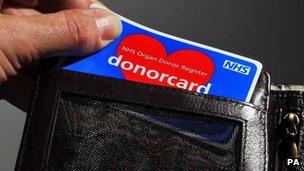Organ transplants reach record high, NHS figures show
- Published

The increase in the number of transplants follows a rise in organ donations in recent years
The number of organ transplants carried out in the UK has reached a record high, health service figures show.
NHS Blood and Transplant (NHSBT) said there were 4,212 transplants in 2012-13, up 6% on the previous year.
About a quarter were from a living donor giving a kidney or a liver part, the rest involved people who had died.
The increase is being put down to a rise in the number of donors - earlier this year it was announced this was up 50% since 2008.
'Biggest problem'
The donor increase is being attributed largely to the work of specialist nurses who approach and support bereaved relatives in hospital.
But NHSBT warned that extra donors were still needed.
At the end of March there were 7,332 patients waiting for a transplant, plus another 3,030 temporarily unable to have one for reasons such as being too ill to have an operation.
Some 466 patients died while on the waiting list for a transplant.
Last year four out of 10 bereaved families refused to consent to donation, one of the highest rates in Europe.
Sally Johnson of the NHSBT said: "These donations ensured that for the eighth year in succession the number of people benefiting from an organ transplant increased.
"But although we have seen year-on-year increases in activity the UK can and must do more to save and improve lives through organ donation and transplantation, and family refusal is now our biggest problem.
"If the NHS is to save even more lives, more people need to sign up to be a donor, more people need to discuss donation with those close to them and more families need to support donation on behalf of a loved one."
Professor Anthony Warrens, president of the British Transplantation Society, said: "It is very gratifying to note that we have performed over 4,000 transplants in 2012-13 for the first time ever in a single year."
- Published5 August 2013
- Published11 July 2013
- Published2 July 2013